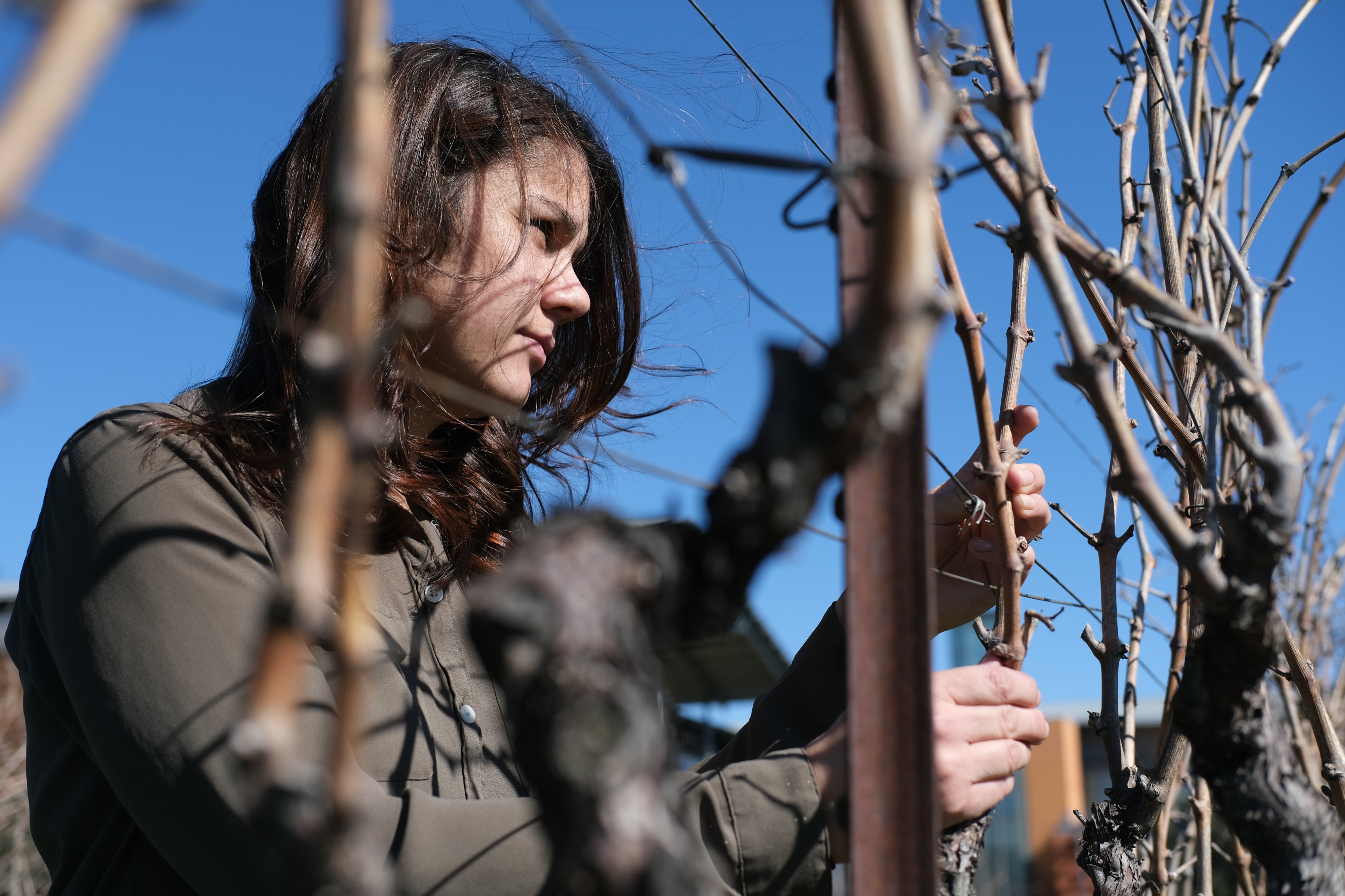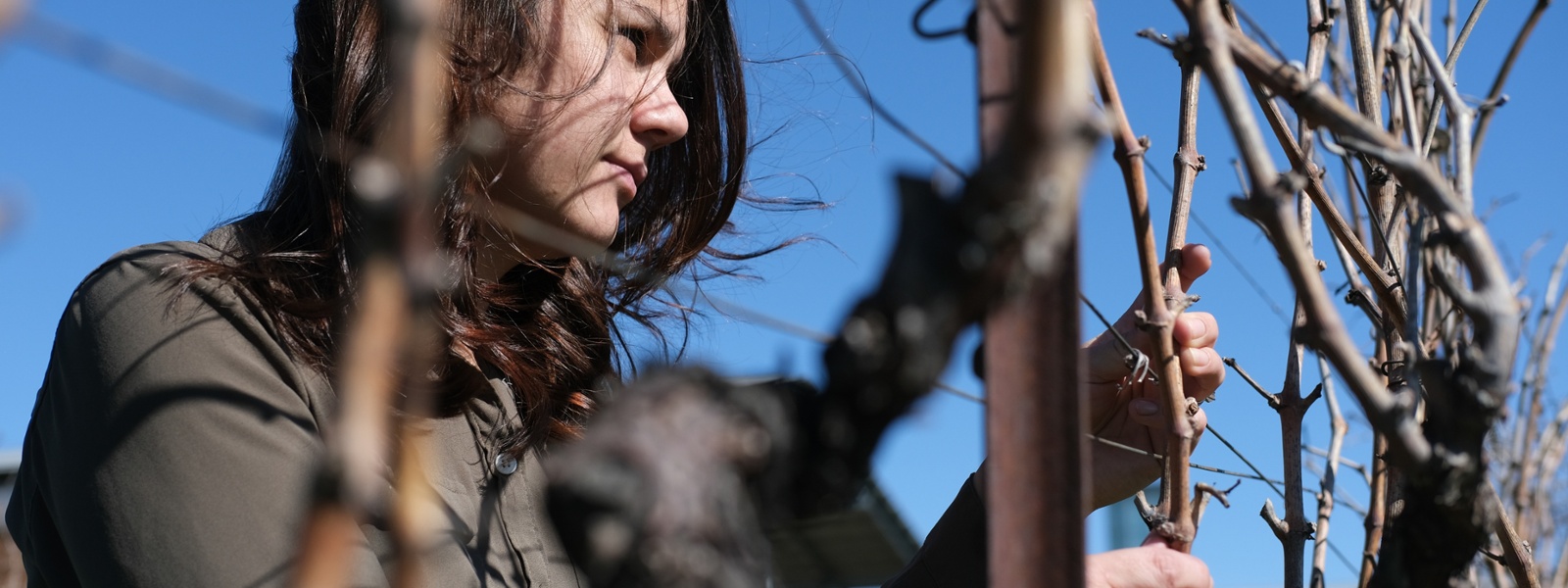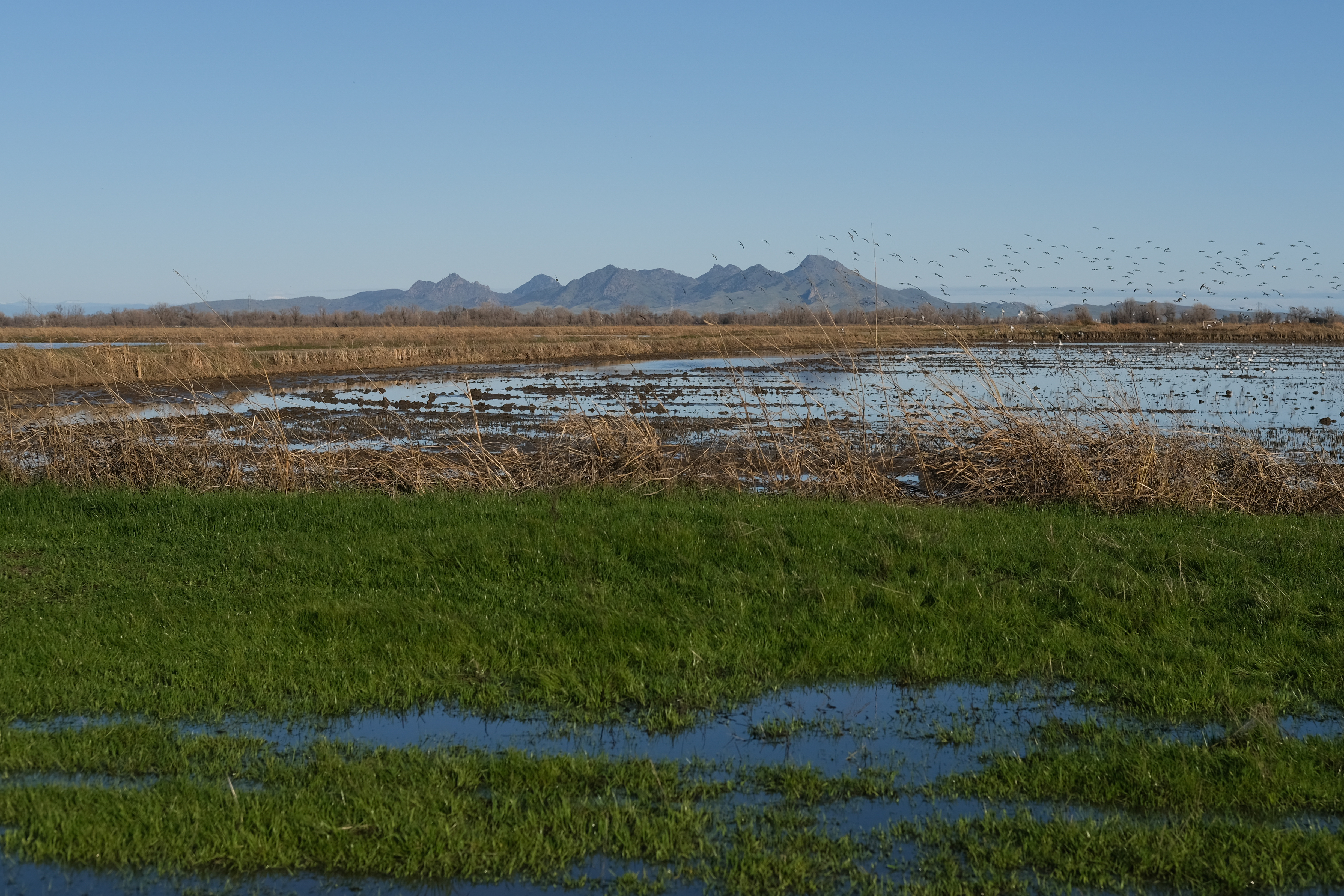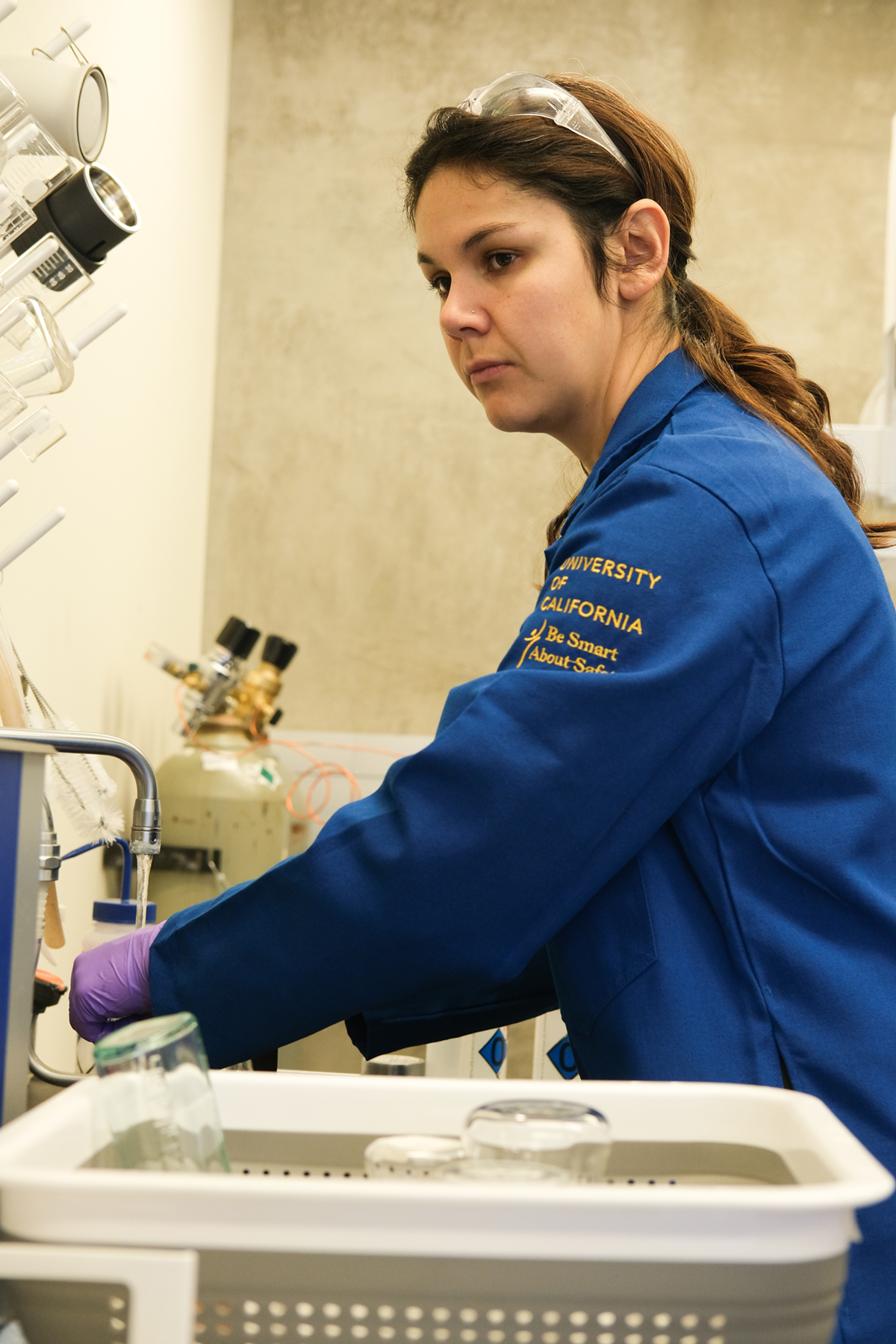Purge of federal support jolts agriculture

Arran Rumbaugh, former research chemist at the U.S. Department of Agriculture Agricultural Research Service, handles grapevines last week outside her former lab at the University of California, Davis. Rumbaugh, who was one of USDA’s only smoke taint researchers in California, was fired Feb. 13.
Photo/Caleb Hampton

By Caleb Hampton
The Trump administration’s mass firing of federal employees and its withholding of federal funds during the past month have impacted farmers who for decades have partnered with the federal government for conservation, infrastructure and equipment upgrades, research and other work critical to agriculture.
“We have been constantly assessing the impacts because these actions touch so many areas of the federal government that farmers and ranchers interact with,” said Erin Huston, natural resources and land consultant for the California Farm Bureau. “We are concerned about the impacts to both agriculture and the rural communities agriculture serves.”
Among those affected were farmers expecting repayment under federal conservation contracts, such as those funded through the U.S. Department of Agriculture Natural Resources Conservation Service and its Partnerships for Climate-Smart Commodities grants.
The programs provide financial and technical support so that farmers can upgrade equipment or implement farming practices that aid their operations while providing a public conservation benefit such as improving air quality or conserving habitat.
Steven Cardoza, an organic raisin grape grower in Fresno County, is awaiting disbursement of $60,000 in federal grants after spending tens of thousands of dollars on soil sensers to improve his water efficiency, labor for hand weeding to minimize soil disturbance and retain topsoil, and other investments on his farm.
“It’s not ideal,” Cardoza said, adding that program staff told him the money was frozen.
Steve Fukagawa, an organic stone fruit and raisin grape grower in Kings County, is owed $7,000 under an NRCS contract to share the cost of applying compost and planting cover crops, practices that improve soil health and fertility and create habitat.
“That’s on hold,” Fukagawa said he was told.
He said he also worried an NRCS program that helps with the cost of replacing old tractors with new models may be canceled. Fukagawa applied for two tractors. He used the program before, he said, and was “very pleased with the new tractors,” which during some tasks burned diesel at half the rate his old tractors did. “They’re much more efficient,” he said.
Fukagawa said he was “dubious” the program would be maintained due to its connection to environmental concerns and because his other NRCS payment was held up. “This is the first time the feds have fallen through on their promise to release a contract,” he said.
‘A make-or-break situation’
Helen McGrath, board president of the Southside Improvement Co., a mutual water company in Ventura County that serves more than 60 shareholder farms, including McGrath’s citrus and avocado farm, has even more at stake. “In our case, and in many other operations’ cases, it’s a make-or-break situation,” she said.
The water company was awarded a multiyear grant from NRCS worth $255,000 to line its reservoirs and install more efficient pumping systems that would conserve water and save energy. After decades of deferred maintenance, the company cannot afford to make the upgrades without the grant money, nor can the farms continue paying such high water and energy costs, McGrath said.
“It won’t pencil out,” she added.
With roughly half the shareholder farms lacking their own wells and the other half pulling up low-quality water during dry years, she said, the future of dozens of family farms may depend on the grant.
As a result of the funding freeze, “We’ve been in purgatory for the last few weeks,” she said. Last week, NRCS staff advised the company to proceed with plans to begin work. But President Donald Trump’s interference with funds appropriated by Congress and the whiplash of contradictory court rulings, government statements and reports of still-frozen accounts have given the company pause.
“We worry that six months from now we will not be reimbursed for the work,” McGrath said. “It’s very frustrating.”
Honoring contracts
Last Thursday, U.S. Agriculture Secretary Brooke Rollins said USDA will release roughly $20 million in NRCS contracts held up during a review of funding appropriated through the Biden administration’s Inflation Reduction Act.
“Secretary Rollins will honor contracts that were already made directly to farmers,” USDA said in a press release. The department said it was releasing “the first tranche” of funds as it continues to review IRA funding to ensure it is being used to support farmers and not to promote diversity or “far-left climate programs.”
The release of $20 million in contracts is a small portion of federal grant funding promised to farmers. In October, USDA announced $7.7 billion in funding for farmers to implement conservation practices this year, with $5.7 billion coming from the IRA and $2 billion from the Farm Bill. The two pots of money are largely used to fund the same programs, with IRA funds extending access to Farm Bill programs.
Federal agencies are generally required to spend funds appropriated by Congress. The Trump administration rescinded its memo directing agencies to freeze funding after it was blocked in court, but there have been widespread reports that funds remain inaccessible. On Feb. 10, U.S. District Court Judge John McConnell said the Trump administration had violated his order blocking the freeze.
Fukagawa said NRCS staff called him last Friday to sign paperwork for his $7,000 payment to be processed, though as of Monday neither he nor Cardoza had received their money.
Staffing shortages
Meanwhile, in mid-February, the Trump administration fired tens of thousands of federal employees, including many at USDA and other agencies that interact with farmers, while encouraging other employees to resign. Those fired were primarily probationary employees who had held their position for less than 1 to 3 years and lacked job protections.
Federal workers said the layoffs could derail conservation programs, research and other services that support agriculture.
A worker at one federal agency, who asked not to be named because he was not authorized to speak on behalf of the agency, said a program that partners with ranchers on conservation lost its only biologist serving part of the Central Valley.
“Without biologists in place, we are unable to put money on the ground,” the employee said, referring to conservation work that may halt due to the firing of key staff.
Employees at many NRCS field offices were also fired, according to a person with knowledge of personnel at more than a dozen offices, causing “massive staffing shortages,” and raising concerns about field office capacity to authorize contracts.

Photo/Caleb Hampton
Agricultural research
The mass firing of federal workers has also disrupted scientific research conducted to benefit farmers.
Arran Rumbaugh, former research chemist at the USDA Agricultural Research Service, was hired to research smoke taint in winegrapes after wildfire smoke caused roughly $4 billion in losses for California’s wine industry in 2020.
“I was trying to develop tools for risk assessment and how we can create a screening method so grape growers can understand if they have smoke impact or if they don’t,” said Rumbaugh, who was based at a lab at the University of California, Davis.
In 2020, when many growers were impacted at once, testing backlogs at labs that analyze grape samples led to wait times of three to seven weeks, providing results too late for farmers to make the all-important decision of whether to harvest their crop.
Rumbaugh was working to develop an absorbent tube growers could place in their vineyards that would passively collect air and could be tested—quickly and cheaply—for specific compounds after a smoke event. The aim was to provide results “within a day, if not an hour or minutes,” she said, “so growers can make those decisions.”
On Feb. 13, Rumbaugh was among thousands of federal employees fired by email, bringing her research to a halt. She was one of USDA’s only dedicated smoke taint researchers in California.
USDA scientists researching dozens of other specialty crops were also laid off this month, according to various news reports, a blow that could be especially painful for California’s heavily diversified agriculture sector. A study by the USDA Economic Research Service found that for every $1 spent on crop research, about $20 is generated for the U.S. economy.

Photo/Caleb Hampton
‘Just the beginning’
The consequences of the sweeping cuts for agricultural research and conservation are a sliver of the overall impact. Mass layoffs of U.S. Forest Service staff working to mitigate wildfire risks made national headlines, as did the firing of air traffic controllers, tax auditors and personnel working on the government’s bird flu response and its nuclear weapons management—some of whom the administration quickly rehired.
Other impacts are still being identified. “California Farm Bureau members have most definitely been affected,” said Huston, adding that the organization had heard from members awaiting reimbursement of large sums from rural development contracts for conservation practices, solar panel installation and other projects.
On Saturday, Trump called for a “more aggressive” purge of federal workers. Rollins, the agriculture secretary, has welcomed the cuts and said more are coming.
“USDA is pursuing an aggressive plan to optimize its workforce,” the department said in a statement. “This is just the beginning.”
UPDATE: Arran Rumbaugh was rehired this week to her former position as a research chemist at the U.S. Department of Agriculture Agricultural Research Service. She will resume her work at USDA researching smoke taint in winegrapes at a lab at the Robert Mondavi Institute for Wine and Food Science at the University of California, Davis. Many other researchers remain laid off. “It’s been a rollercoaster,” Rumbaugh said.
(Caleb Hampton is an assistant editor of Ag Alert. He may be contacted at champton@cfbf.com.)




